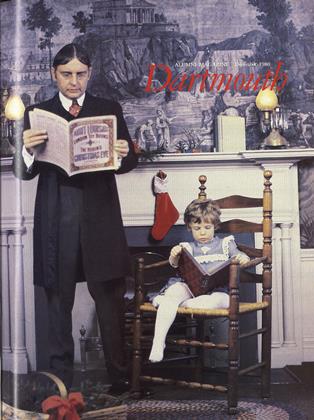EVER YTHING THA TMOVES A Documentary Novel by Budd Schulberg '36 Doubleday, 1980. 251 pp. $10
This novel, the seventh by Schulberg, tells of the rise (and fall) of an opportunistic, macho labor leader, who heads a union, the International Brotherhood of Haulers and Truckers, that sounds suspiciously like the Teamsters. Indeed, the fictional labor leader's name, Joey Hopper, has more than an echo of Jimmy Hoffa to it. To continue the parallel, Joey Hopper disappears from the public view, bludgeoned to death and tidily encased in swimming pool Gunite, ironically at a site being readied as a summer camp for the children of IBHT unionists.
On the way to this unusual tomb, Joey Hopper rises quickly from oil-rig driver through the hierarchy of the union to become its head, stepping on a neck here, a sensibility there. Under his impetus the union branches out, sucking up gas-station attendants, juke boxes, whatever and is not loath to play footsie with big business, or the mob. Joey Hopper gets the power and, of course, gets the corruption.
Toward the end of the book, a younger incarnation of Joey surfaces, Tommy Nielsen, a visionary, a reformer from Joey's old home town. He forms a splinter group from the IBHT called Return Our Labor Liberties (an acronymically too apt ROLL). His motto is "If you quit, you die."
At novel's end, it is not entirely sure (as it never is in life) whether the Nielsen forces of good will triumph over the entrenched forces of evil, but there is just the hint that Schulberg thinks they will. Or, at the very least, hopes they will.
Schulberg, whose past track record has shown him to be very knowledgeable about the intricacies of union life (On the Waterfront) and the Byzantine nature of ambition (WhatMakes Sammy Run), continues to show his wisdom in these areas in this book. At times, the twists and turnings require close attention, as he uses the device of italic inserts giving testimony before a Senate committee investigating the IBHT, which interrupt the narrative line. But, on the whole, these are used skillfully, as one would expect from a writer of Schulberg's attainments.
On the whole, though, I came away from the book feeling that it is somehow thin, that it is not worthy of its author. An unabashed admirer of Sammy, The Harder They Fall, and The Disenchanted, I felt let down by this one. (A slight cavil, and it is admittedly that: Schulberg's use of phonetics to imitate trucker, and tough guy, conversation is an irritation. The elisions, the dropping of the final "g" on participles do not have the cadences of true dialogue.)
Yet there is this, one of the corrupt big businessmen talking: "This isn't an age of ethics. It's the age of big muscle and big bucks, and what works is what's right." And then, the hard-working idealistic Senate investigator musing to himself: "... he guesses he'll go back to the office after all. Keep pushing that stone up the mountain."
That, I think, is what Schulberg is trying to tell us. And, after this election year, the Sisyphean adjuration couldn't be more right.
James Farley is a longtime journalist andfrequent reviewer for the ALUMNI MAGAZINE.
 View Full Issue
View Full Issue
More From This Issue
-
 Feature
FeatureAll the Way with J.B.A.
December 1980 By Frank Smallwood -
 Feature
FeatureOnce Upon a Time
December 1980 -
 Article
ArticleQuirkiness to Taste
December 1980 By Dana Cook Grossman -
 Class Notes
Class Notes1966
December 1980 By RICK MAC MILLAN -
 Article
ArticleMetaphysical Voyager
December 1980 By Robert H. Ross ’38 -
 Class Notes
Class Notes1940
December 1980 By RICHARD J. GOULDER
James L. Farley '42
-
 Sports
SportsBig Green Teams
April 1942 By James L. Farley '42 -
 Article
ArticleFull-Fledged Commencement Returns
August 1946 By James L. Farley '42 -
 Article
ArticleADVOCATE OF PLENTY
November 1946 By JAMES L. FARLEY '42 -
 Feature
FeatureTHE ACRONYM SYNDROME
MARCH 1973 By JAMES L. FARLEY '42 -
 Feature
FeatureA Shapely Punctuation Mark
July 1974 By JAMES L. FARLEY '42 -
 Article
ArticleSquire of Tatterhummock
May 1979 By JAMES L. FARLEY '42
Books
-
 Books
BooksFaculty Publications
-
 Books
BooksShelf Life
Sept/Oct 2004 -
 Books
BooksHOW TO SUCCEED AT TOUCH FOOTBALL.
MARCH 1963 By CLIFF JORDAN '45 -
 Books
BooksPRIVATE WOMAN, PUBLIC STAGE: LITERARY DOMESTICITY IN NINETEENTH-CENTURY AMERICA
OCTOBER 1984 By HENRY TERRIE -
 Books
BooksTHAT MEN MAY UNDERSTAND
May 1941 By Louis P. Benezet '99 -
 Books
BooksMirror Images
September 1978 By PHOEBE STORRS STEBBINS


